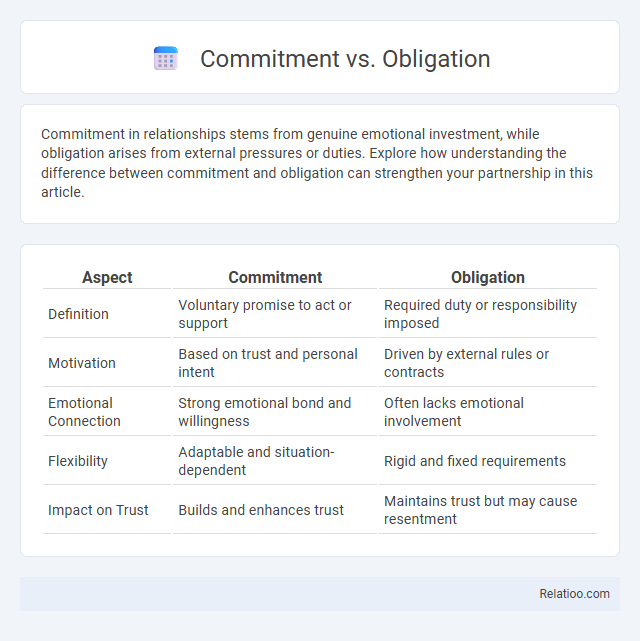Commitment in relationships stems from genuine emotional investment, while obligation arises from external pressures or duties. Explore how understanding the difference between commitment and obligation can strengthen your partnership in this article.
Table of Comparison
| Aspect | Commitment | Obligation |
|---|---|---|
| Definition | Voluntary promise to act or support | Required duty or responsibility imposed |
| Motivation | Based on trust and personal intent | Driven by external rules or contracts |
| Emotional Connection | Strong emotional bond and willingness | Often lacks emotional involvement |
| Flexibility | Adaptable and situation-dependent | Rigid and fixed requirements |
| Impact on Trust | Builds and enhances trust | Maintains trust but may cause resentment |
Understanding Commitment and Obligation
Understanding commitment involves recognizing a voluntary dedication driven by personal values or goals, resulting in sustained effort and emotional investment. Obligation, in contrast, arises from external requirements or duties imposed by laws, contracts, or social norms, often motivating compliance rather than passion. Distinguishing these concepts clarifies why commitment typically fosters proactive engagement, while obligation may lead to reluctant adherence.
Defining Commitment: A Deeper Connection
Commitment embodies a deep, personal dedication that goes beyond mere obligation or responsibility by fostering emotional investment and long-term intent. Unlike an obligation, which often arises from external expectations or duties, commitment reflects your genuine choice to prioritize and nurture a relationship, goal, or value consistently. This deeper connection fuels perseverance and meaningful engagement, ensuring that your actions align authentically with your core beliefs and aspirations.
What Is Obligation? Duty and Expectation
Obligation refers to a legal or moral requirement to perform a specific action, often binding you through rules, laws, or contracts. Duty is a broader concept involving responsibilities derived from ethical, social, or professional standards, reflecting what is expected of you. Expectation, in contrast, is an anticipated behavior or outcome based on social norms or personal assumptions, often less formal but influencing commitment and obligation.
The Psychological Roots of Commitment
The psychological roots of commitment stem from intrinsic motivations and personal values that bind individuals emotionally and cognitively to a cause or relationship. Unlike obligation, which arises from external pressures and social norms, commitment involves a deep-seated sense of identity integration and intentional choice. Understanding these underlying psychological mechanisms clarifies why commitment fosters resilience and persistence beyond mere compliance.
Social and Cultural Influences on Obligation
Social and cultural influences shape the perception of obligation by embedding expectations within communal norms and traditions, often dictating behaviors through collective values. Obligations are viewed as essential duties imposed by social roles, family structures, and cultural rituals, reinforcing group cohesion and identity. This contrasts with commitment, which is typically a self-driven promise, emphasizing personal intention over externally imposed demands.
Key Differences Between Commitment and Obligation
Commitment involves a voluntary dedication to a cause or activity driven by personal values or goals, whereas obligation refers to a duty imposed externally, often by social, legal, or moral rules. Your commitment stems from intrinsic motivation and emotional investment, making it a choice, while obligation is typically enforced through external pressures and expectations. Understanding these key differences clarifies how you approach responsibilities and relationships, distinguishing heartfelt promises from mandatory duties.
How Commitment Drives Motivation and Passion
Commitment fuels your motivation by creating a personal connection to goals, leading to sustained effort and enthusiasm. Unlike obligation, which can feel externally imposed and limit engagement, commitment generates intrinsic passion that drives perseverance through challenges. This deep sense of dedication transforms tasks into meaningful pursuits, enhancing productivity and fulfillment.
The Impact of Obligation on Well-being
Obligation can significantly affect well-being by creating stress and reducing personal autonomy, often leading to feelings of resentment or burnout when individuals feel forced rather than willing to act. Unlike commitment, which typically involves voluntary dedication aligned with personal values, obligation imposes external pressure that may undermine motivation and satisfaction. Managing obligations effectively and setting healthy boundaries is essential for maintaining mental health and ensuring positive emotional outcomes.
Balancing Commitment and Obligation in Relationships
Balancing commitment and obligation in relationships requires understanding that commitment stems from genuine emotional investment, while obligation often arises from external expectations or duties. Prioritizing mutual respect and open communication helps partners navigate obligations without sacrificing the authenticity of their commitment. Maintaining this balance fosters trust and long-term relationship satisfaction by aligning personal values with shared responsibilities.
Choosing Commitment Over Obligation for Personal Growth
Choosing commitment over obligation empowers individuals to pursue goals with genuine passion and intrinsic motivation, fostering deeper personal growth and resilience. Commitment involves a voluntary, heartfelt dedication aligning with one's values, whereas obligation often stems from external pressure or duty, potentially leading to resentment or burnout. Prioritizing commitment enhances self-awareness, intentionality, and sustained effort, driving meaningful development and fulfillment.

Infographic: Commitment vs Obligation
 relatioo.com
relatioo.com